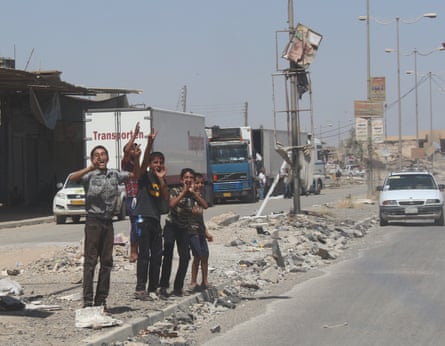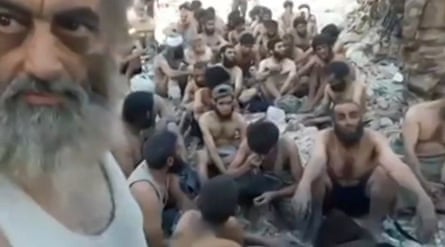The body of a long-haired Islamic State militant lies rotting in the scorching heat. Blast-strewn cars and bullet holes in walls bear witness to a fierce firefight that took place in the Zanjili neighbourhood of west Mosul.
Once a stronghold of Isis, Zanjili is now a ghost town. Life has stopped and nothing moves; even the stray cats and dogs that roam other parts of the city, feeding on the dead, are nowhere to be seen. The eerie silence is punctured by occasional volleys of heavy gunfire from two Iraqi helicopters firing at Isis positions in the remaining militant-held pockets of the old city less than half a kilometre away.
The total destruction of Zanjili is a testament to the enormous task ahead for the Iraqi prime minister, Haidar al-Abadi – the reconstruction of this city at a time when lower oil prices have severely depleted government coffers. The UN has estimated that repairing basic infrastructure in the city will cost more than $1.3bn (£990m).
“In western Mosul what we’re seeing is the worst damage of the entire conflict,” Lise Grande, the UN’s humanitarian coordinator for Iraq, said last week. “In those neighbourhoods where the fighting has been the fiercest, we’re looking at levels of damage incomparable to anything else that has happened in Iraq so far.”
Several men and a woman scavenging through Zanjili emerge from a side street. “This place is destroyed,” said Mohammad Fathi Salih, 26, a teahouse owner. Salih does not know how many customers who sipped his sweet tea every day are dead. “Many people died here. There was a baby who died of hunger because there was no food.”

He showed the Observer a mass grave in this once densely populated area, in the front yard of a school whose roof had blown away. “We had no other place to bury them. We buried 151 people here,” said Salih, emphasising the number. “There were women, children, young, old. We brought them from streets around here one by one.”
“The planes hit and Daesh killed,” replied Salih when asked who was responsible for the civilians killed in his neighbourhood.
The US-led coalition has admitted that its airstrikes in Iraq and Syria have killed more than 480 civilians, but Airwars, a not-for-profit organisation which tracks civilian casualties, believes that at least 4,500 have been killed as a result of coalition airstrikes.
In west Mosul, the government has yet to begin reconstruction. However, on the highway from Baghdad to Mosul, a road roller and excavator are in operation as engineers try to rebuild a bridge. There is little economic activity in this once busy street, except for two makeshift petrol stations, several mechanic’s shops and kids on the back of pickup trucks selling ice in the 50C heat.
No road has stayed intact in Mosul. Huge potholes make it difficult for non-military vehicles to move easily. Cars inside Mosul often lack rear windshields or wing mirrors. Large numbers of vehicles were destroyed in the fighting and some people have resorted to using mules and horse-driven carts to carry goods or to move around.
Meanwhile, security service surveillance is creating an atmosphere of suspicion and distrust. Yet children stand at roadsides and cheer on troops and foreigners.
When Abadi announced the liberation of the city on 9 July, Isis propaganda outlets announced on social media the assassination of an officer and three of his bodyguards in east Mosul’s Tahrir neighbourhood, which was liberated late last year. Many people are scared to go back to their houses, if indeed they still exist, because of a lack of security and basic services. “I can’t go back to the city because my house was destroyed in the fighting. There is no security in Mosul because, even in the east of the city, there are still Daesh [Isis] sleeper cells and they occasionally strike,” said Salih Mohammad, who fled west Mosul last week and, like thousands of others, is now staying in a camp outside the city.
The UN’s International Organisation for Migration estimated last week that more than a million people had been displaced from east and west Mosul and that there were more than 800,000 people living in camps.

While the conditions in these camps are poor, many people prefer to stay in their tents than go back to Mosul.
“Some people go back to east Mosul because the conditions in the camps are not good, especially in this heat, but when they get there … many turn around and come back to the camps,” explained Bnar Duski, who has worked for the Barzani Charity Foundation with displaced people in five camps in east Mosul.
While maintaining security and rebuilding the city is vital for enticing people to return, the behaviour of the Iraqi security forces – which include Shia soldiers – towards the mainly Sunni residents will be one of the ways in which Baghdad’s efforts will be measured in Mosul. Many are quick to point out that the reason, in the summer of 2014, for Isis’s success in the city – an insurgent flashpoint since 2003 – was the abuses of the Iraqi security forces, which led to alienation.
“Since 2003, Iraqi forces have carried out abuses against the civilian population with complete impunity, mainly targeting Sunni Arabs,” said Belkis Wille, senior Iraq researcher at Human Rights Watch. “They have carried out campaigns of arbitrary detention, enforced disappearance, torture and extrajudicial killings. These have all been key push factors for young Sunni Arab men to join Isis.”
Iraqi security forces’ reputation suffered a blow last week when about a dozen videos showing troops’ brutality were published on social media. One shows a soldier stabbing a man in the neck and face as he shrieks in pain and begs for his life. “This is for the martyrs,” says the soldier as the man lies in a pool of blood.
In the past nine months, Iraqi security forces have been mired in a number of incidents contrary to the rules of conflict but Baghdad has stayed silent.
“The battle for Mosul is meant to be the final major battle in Iraq against Isis and yet this battle has opened the floodgates to those very campaigns of abuse, and the videos and testimony of abuse that have emerged have been met with silence from Baghdad,” said Wille. “If the Iraqi authorities and the US-led coalition really want to put an end to Isis, they need to not only engage militarily but tackle the push factors – put an end to abuses [carried out] with impunity. Otherwise we will not see an end to extremist groups in Iraq any time soon.”
Mohammad, a former police officer from Noor in east Mosul who now drives a taxi on the city’s outskirts, questions whether the Iraqi government has learned from its mistakes.
“Now we have Shia flags everywhere,” he said, referring to the banners depicting the prophet Muhammad’s nephew Ali and his grandsons Hassan and Hussein revered by Shia Muslims. “Sunnis of Mosul see these flags as insults.”
As the car approaches Bartella in east Mosul, where the Iraqi security forces have incarcerated close to 200 families of alleged Isis militants in a “rehabilitation” camp, Mohammad points to the graffiti on the blast wall.

“The State of Ali, enduring and expanding” is the triumphant claim, playing on the motto of Islamic State.
It is the kind of message that fuels Mohammad’s pessimism, as the devastated city contemplates the mammoth double challenge of reconstruction and reconciliation.
“I would be happy if Mosul becomes normal again in 20 years,” he said.
